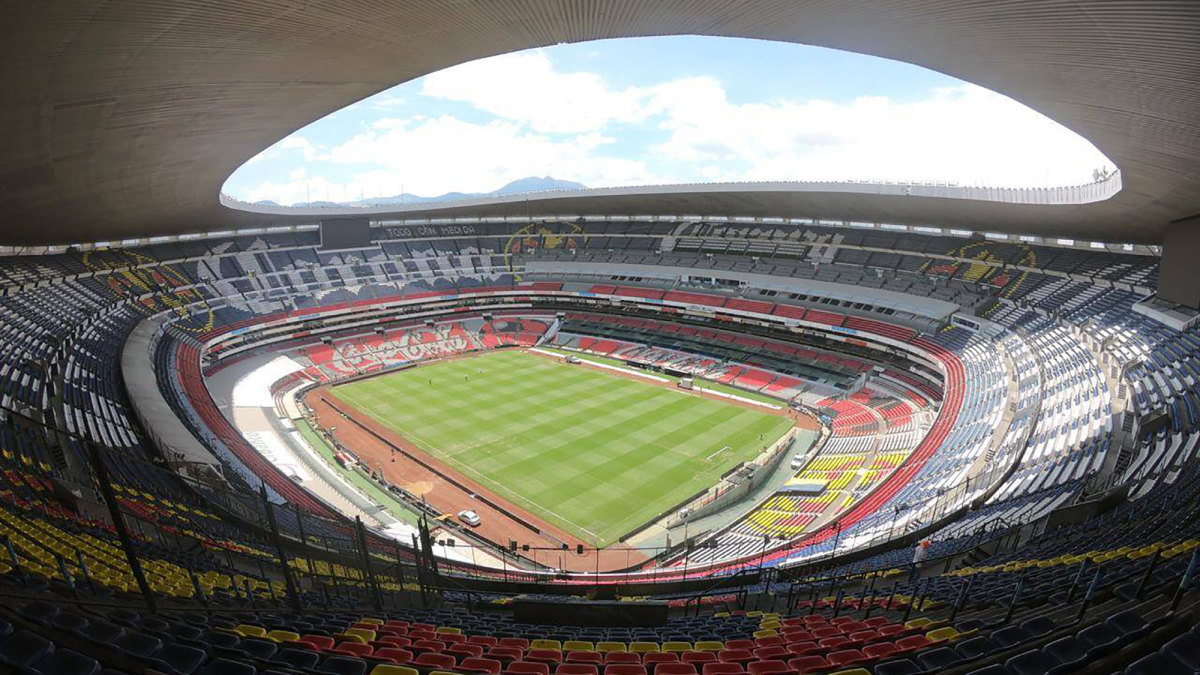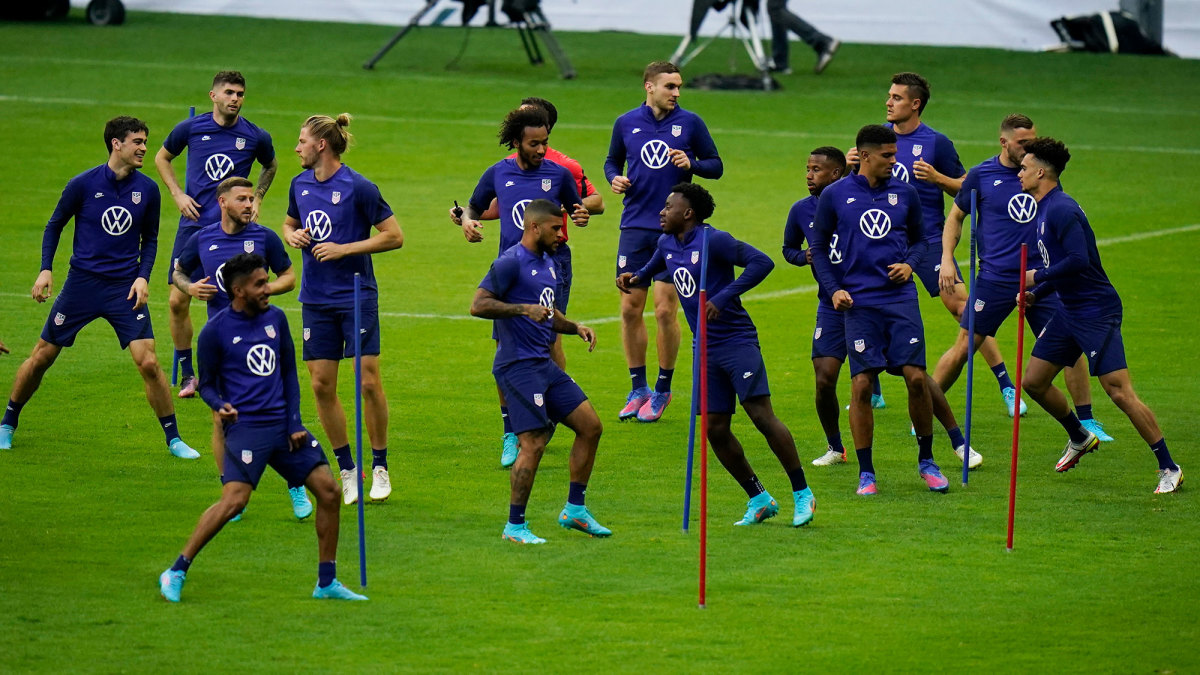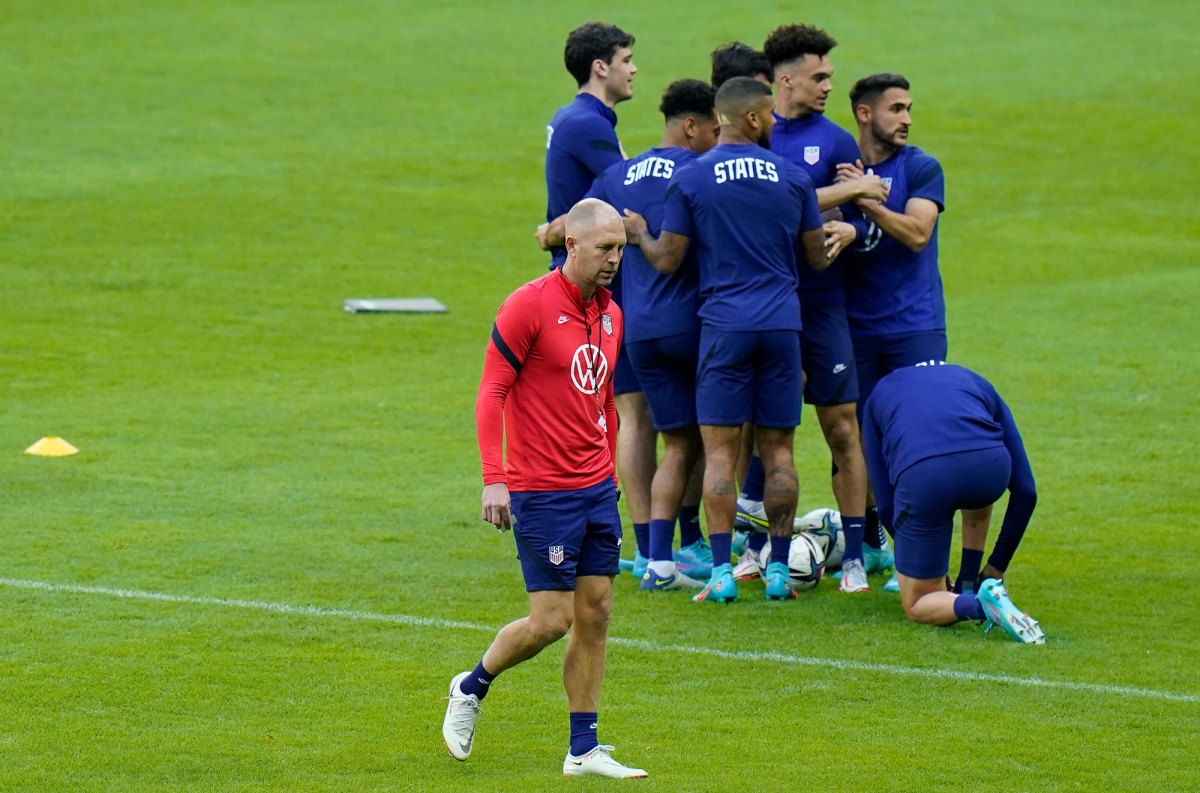The Azteca Approach: USMNT Balances History, Opportunity, Big World Cup Picture in Mexico
MEXICO CITY — The U.S. Soccer Federation’s buildup toward Thursday’s World Cup qualifier here in the sprawling Mexican capital included a video and feature on the American men who’ve scored against El Tri at the Estadio Azteca. The first was Willy Roy, the German-born, Chicago-bred National Soccer Hall of Fame forward who struck in the initial meeting between the sides at the massive new stadium south of the city center.
That was back in 1972. Since then, through five decades and 12 additional encounters, Roy has been joined by only five more compatriots. Simply scoring once at Azteca is so noteworthy that it’s become something worth commemorating. A win is almost unheard of. The American men are 1-9-3 all-time at the famously intimidating venue, the lone victory coming in a relatively low-key (by U.S.-Mexico standards) friendly a decade ago. And the rest of the region hasn’t fared much better. El Tri has dropped just two qualifiers at Azteca in 50 years.
“Our record here is horrendous, you know? The odds are against us getting something out of this game,” U.S. coach Gregg Berhalter said here Wednesday. “We know that. We realize that and that’s just how it is, and we’re focused on going in and being difficult to play against—competing.”

Thursday’s qualifier isn’t technically a must-win. The U.S. (6-3-2) is in decent position in second place in the Octagonal, the eight-team Concacaf competition that’ll send the top three finishers to this fall’s Qatar World Cup and a fourth to a one-game playoff this June. Three points across the three upcoming games against Mexico, Panama and Costa Rica could be enough, and four points likely will be.
But Thursday’s match is a must-compete. The games come much too quickly and the stakes during this climactic qualifying window are far too high to risk losing momentum or confidence. With the crucial home match against Panama scheduled for Sunday in Orlando and then a possible make-or-break trip to Costa Rica just three days later, it’ll be vital to ensure that the Azteca—which sits at a breathless altitude of 7,200 feet—doesn’t sap too much energy, fitness or focus. The Americans already are shorthanded thanks to recent injuries suffered by midfielder Weston McKennie, defender Sergiño Dest and winger Brenden Aaronson. And Berhalter has several more players on his 26-man roster—including linchpin Tyler Adams—on the verge of yellow-card suspension.
There are trends tilting the visitors’ way, however. They’re seeking an unprecedented fourth straight win vs. Mexico, entering on the heels of three consecutive victories in official competition: last June’s Concacaf Nations League final, the Gold Cup final two months later, and then the emphatic 2–0 qualifying triumph in November. In addition, Mexico’s dominance at the Azteca has shown slim signs of waning. El Tri (6-3-2) has tied both Canada and Costa Rica at home during the Octagonal, and they’re 0-1-2 the last three times they hosted the U.S.-Mexico’s most recent rivalry win at the Azteca came in 2009.
“They obviously have so many quality players, and a lot of them are playing in Europe just like myself. And you know we don’t have the ability to play at altitude every day,” said Adams, who plays at RB Leipzig. “So I think it has an effect on everyone unless you’re playing there and training there consistently.”
Seven of Mexico’s 29 players are based at clubs from the capital.
“We know it’s not going to be easy. Of course we’ve got the better of them in the last couple games, but that means nothing coming into tomorrow’s game,” U.S. star Christian Pulisic said Wednesday. “So we’re going to need to battle. We’re going to need another top performance—continuing to do the things that we have been doing in the past games against them. And we’re going need an amazing performance to win the game tomorrow.”
Most elite athletes really do take one game at a time. It’s not just a cliché. They give everything to win the match in front of them and try to avoid the distractions or worry that might come from looking too far ahead. A U.S. setback at the Azteca won’t result from an absence of effort or will.

“We plan on going down to Mexico to win the game,” said winger Paul Arriola, one of the four players on this U.S. roster who appeared in the 2017 qualifier at Azteca (a 1–1 draw). “For us, the mentality is to go full-throttle no matter who’s playing, have the right mentality, and we believe in this group we can accomplish what we need to.”
Coaches, however, have to manage for the longer term and try to see around corners. And the story of this final window will depend heavily on how Berhalter and his staff approach the Azteca and then, by extension, the subsequent matches.
Several Americans, including the likes of Adams, Tim Weah, Gio Reyna, Zack Steffen and Ricardo Pepi, haven’t been consistent 90-minute players in recent weeks. Starting three difficult games in seven days for anyone is tough, especially when the first is contested in thin and hazy air. For those lacking consistent club minutes, it’ll be even harder.
Berhalter could start his “best” XI against Mexico and risk emptying a few tanks in search of an unlikely but potentially massive cushion heading into the final two contests. Or, with the understanding that Sunday’s showdown with fourth-place Panama could determine his World Cup fate, Berhalter could opt to conserve their legs and energy. Some sort of hybrid or middle ground is possible as well. It’s a puzzle that’s been on the manager’s mind for a while.
“I heard that argument. You know, we should play a ‘B’ team [in Mexico]. And what I did is I took it to the staff, and we debated it and we looked at all sides of it,” Berhalter said. “I think it was an important exercise to do for us, to be able to do that. And you know we came out with our answer and you’ll see tomorrow. … There’s no harm in looking at both sides of this thing, and we know that the Panama game will be an important game. But we also know Mexico will be an important game. We also know Costa Rica has the potential to be an important game. So our mindset is one game at a time.
“One thing I told the staff in our meeting as we started camp was, ‘You know, this is probably the biggest week of our lives as professional coaches.’ And that’s just honest.”

The pressure is immense. More than four years after the shocking and disastrous loss in Trinidad that cost the U.S. a trip to the 2018 World Cup, the long wait for redemption is ending. The next week will serve as a referendum on Berhalter and the young and talented generation of players that now forms the heart of the national team, not to mention the long-term direction of American men’s soccer.
“I’ve been looking forward to it for years now,” said Pulisic, whose postgame tears that night in Couva were a poignant and enduring symbol of U.S. despair. “It’s been a massive goal of mine and this team’s, so I’m obviously excited. We’re going to give everything because I and this team 100% want to play in a World Cup.”
That’s a lot to take in. And so apart from Berhalter’s seven-day strategy, the Americans’ best bet Thursday is to live in the moment. The Azteca will destroy you if you’re distracted. Games there can be punishing, but every one is memorable. And they’re staged against a unique backdrop, in an iconic and one-of-a-kind arena that embodies so much of soccer’s history in this part of the world. El Tri fans, desperate to avoid seeing their rivals earn a fourth straight win over their team on their turf, will be eager to turn the tide and anxious to get back inside after attendance was restricted following FIFA sanctions for homophobic cheering. U.S. Soccer was being told Wednesday afternoon that a crowd of up to 50,000 was expected—the refurbished Azteca seats 87,000—as security and identification protocols are implemented.
Watch CONMEBOL World Cup qualifying online with fuboTV: Start with a 7-day free trial!
Those in attendance probably will be witnessing history. The World Cup will be staged in North America in 2026 (the U.S., Mexico and Canada will qualify automatically) and enlarged to 48 teams from then on, meaning it’s possible that Concacaf, with six automatic berths, would keep the Yanks and El Tri apart in future qualifying campaigns. A nine-decade tradition could end Thursday.
Qualifying for Qatar matters. So does the rivalry, the relationship and the troublesome but beguiling history of the Azteca. Ambitious players want to compete in big games. The Azteca isn’t a death sentence, but rather a tantalizing challenge. You can write your name into history just by scoring. Win, and you’re immortal. There’s a lot to balance, consider, gain or lose for both sides.
“There’s no fear. There’s no fear at all,” Adams said. “I think that the best feeling, or again, the minimum, is that every game that we go into, we’re leaving it out all out on the pitch so that we don’t have any regrets. And when we leave it out all out on the pitch, we’re going to win games. That’s the bottom line. So we’re confident in the group and we’re confident in the mentality of the group.”
Berhalter said, “This may be the last qualifier in Mexico between Mexico and the U.S. For us, it’s just a great event. We’re really happy and proud to be playing in this game, and we want to be really focused on this game.
“We have the big goal of qualifying. But this is also a great opportunity for this group, and we’re looking forward to it. I think that single-minded focus is going to be there in the game.”
More Soccer Coverage:
- Straus: The USMNT Braces for Its Final Exam
- Concacaf’s Final World Cup Qualifying Scenarios
- Russia Bids to Host Euros Despite Its FIFA, UEFA Bans
- FIFA Confirms Procedure, How Pots Will Be Determined for World Cup Draw
Sports Illustrated may receive compensation for some links to products and services on this website.
